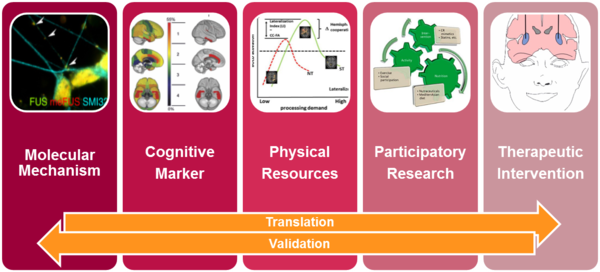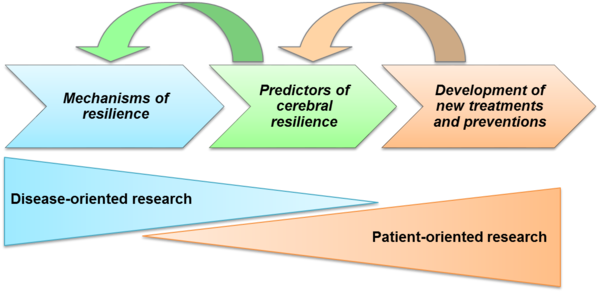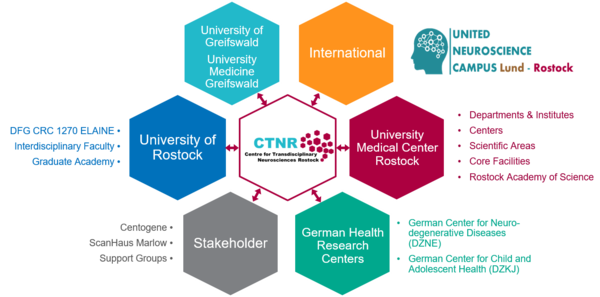About
Centre for Transdisciplinary Neurosciences Rostock
HealthTechMedicine Rostock – Neurosciences: Transdisciplinary methods and their application to neurodegenerative diseases
The University Medical Centre Rostock has a strong focus on transdisciplinary research in resilience and prevention of neurodegenerative diseases, and is one of the few institutions in Germany to systematically develop and use methods of participatory innovation in neurodegenerative brain diseases research.
In November 2017, the Centre for Transdisciplinary Neurosciences Rostock (CTNR) was established to bundle the scientific activities of neurosciences and to improve the visibility and outcomes of the University Medical Centre in the field. The centre focuses on “Resilience in Neurodegeneration – from the model to the patient to the population” and represents one of the main scientific areas at the University Medical Centre.
The overall scientific aim of the CTNR is to identify and target resilience mechanisms in neurodegeneration to implement innovative therapeutic concepts for primary and secondary neurodegenerative processes.
The CTNR creates an interface between clinical and basic research and improves the translational approach. Its concepts of funding programmes and educational training for early career scientists cover the needs of the neuroscience community.

Speaker

Alexander Storch
Professor, Director
Department of Neurology, University Medicine Rostock, Germany
Research areas: basic mechanisms of novel therapeutic approaches in Parkinson’s disease
Co-Speaker
Rüdiger Köhling

Professor, Director
Oscar-Langendorff-Institute of Physiology, University Medical Centre Rostock, University of Rostock
Research areas: Animal Models of neurological Diseases, Epileptology and Dystonia Research, Experimental Neurophysiology, Cellular and network functional plasticity
Board Members

Markus Kipp
Professor, Director
Institute of Anatomy
University Medicine Rostock
Research areas: Mechanisms of immune cell recruitment into the central nervous System, Mechanisms of remyelination, Astrocyte and microglia diversity

Stefan Teipel
Professor, Section Head
German Center for Neurodegenerative Diseases (DZNE),
Department of Psychosomatic and Psychotherapeutic Medicine
University Medicine Rostock
Research areas: Improving prediction, diagnosis, treatment and care of dementia

Birgit Völlm
Professor, Director
Forensic Psychiatry
University Medicine Rostock
Research areas: Neurobiology of personality disorders and social cognition, Forensic psychiatry
The overall aim of the CTNR is to identify and target resilience mechanisms in neurodegeneration to implement innovative therapeutic concepts for primary and secondary neurodegenerative processes.
Resilience, in this context, is understood as an integrated concept for physical, cognitive and psycho-social resistance against neurodegenerative insults and/or their impacts. The concept thus ranges from neuroprotective and neuroregenerative factors on the molecular and cell biology level and cognitive and physical resources on the patient level to psycho-social and health system aspects on the population level.
The detailed knowledge of these resilience factors provides new perspectives for disease-modifying therapeutic interventions in primary and secondary neurodegeneration. The CTNR is organized into three tightly connected topics to lead to a qualitative leap in three dimensions:
- Strong focus on mechanisms of resilience und their interplay with neurodegenerative processes to overcome the current standstill in the development of causative treatments for major neurodegenerative diseases.
- Adoption of the concept of precision medicine to neurodegenerative disease care to establish predictors for cerebral resilience in primary and secondary neurodegeneration in humans.
- Adoption of continuous bi-directional translation pathways where patient centeredness and patient-relevance and sustainability for the care system are the guiding principles for the development of new treatments and preventions for neurodegenerative insults.

Ad I. Mechanisms of resilience and their interplay with neurodegenerative processes
This topic is established in various research groups of the theoretical and clinical departments of the University Medical Centre Rostock in strong cooperation with engineer-science institutes of the University of Rostock. This strong connection of biomedical research and engineering science is exemplarily demonstrated by the Collaborative Research Centre (CRC) 1270 “Electrically Active Implants (ELAINE)”. A strong focus of the Rostock neuroscience community is the research on cell and animal models of neurodegenerative diseases with a clear focus on molecular and cellular mechanisms of resilience of neurons and their systems. The CTNR focuses on rare and mostly monogenetic neurodegenerative diseases, such as Amyotrophic Lateralsclerosis (ALS), Niemann-Pick disease and neuronal ceroid-lipofuscinosis (NCL) and on application-oriented animal models of Parkinson’s disease.
Ad II. Precision medicine to establish predictors for cerebral resilience in primary and secondary neurodegeneration in humans
One key topic of the Rostock site of the German Centre for Neurodegenerative diseases (DZNE) is the development of imaging and biochemical biomarkers of neurodegenerative diseases and potential resilience markers. As an internationally unique selling point for Rostock, the whole developmental pipeline of such markers from multimodal animal imaging, functional imaging in small clinical cohorts to populations-based approaches in primary care settings is established in Rostock. Through the integration into large multicentre studies, such as the European DTI Study in Dementia, the European ADNI study, the European Huntington disease network, the German networks on ALS/FTD and Parkinson’s disease together with the cohort studies of the DZNE, Rostock’s neuroscience research is integrated into national and international networks with high visibility and the possibility of fast and targeted recruitment of patient populations. The joint work offers a strong link to fundamental and applied research in computer and cognitive science to develop information and communication technology based measures of human behaviour and function to monitor the course of neurodegenerative diseases and detect intervention effects on physical and functional patient-centred outcomes.
Ad III. Adoption of continuous bi-directional translation pathways for development of new treatments and preventions in neurodegenerative diseases
The competence not only in basic science-oriented research in cell and animal models of neurodegenerative diseases as outlined above, but also a strong expertise in clinical research ensures the continuous bi-directional translational process to overcome current translational roadblocks in the development of novel therapeutic interventions. In this context, intervention is seen as a broad concept integrating all treatment approaching to strengthen physical, cognitive and psycho-social resistance against neurodegenerative insults and/or their impacts. The development of dementia assistance systems is one key topic of the Department Ageing of the Individual and of Society at the Interdisciplinary Faculty of the University of Rostock. In addition, the clinical members within the CTNR (clinical departments and the DZNE) are already conducting more than 30 mono- and multicentre trials in parallel, including investigator-initiated trials (IITs) according to the AMG in various indications such as dementias, movement disorders and motor neuron diseases, which together form a strong basis for the overall aim of the CTNR, namely to implement innovative therapeutic concepts for primary and secondary neurodegenerative processes.
United Neuroscience Campus Lund - Rostock

The idea is the formal and institutional networking of two internationally excellent neuroscientific locations with a large translational focus in order to establish a virtual campus beyond the Lund and Rostock locations on key neuroscience topics.
Schilling-Professorship and Research Group in the field of "Translational Neurosciences"
Successful grant application at the Hermann und Lilly Schilling-Foundation for the establishment of a Schilling-professorship and research group in the fiel of "translational neurosciences" at the Department of Neurology in cooperation with the DZNE.
Research Group "Non-motor symptoms in Parkinson's disease and related disorders"
In cooperation with the DZNE and the Department of Neurology, Rostock University Medical Center.
Participations at the Collaborative Research Centre 1270 ELAINE (ELectrically Active ImplaNts)
- C03: Deep brain stimulation in dystonia models: Biological implementation, approximation of stimulation parameters and analysis of mechanisms (Project leader: Prof. Dr. med. Rüdiger Köhling, Oscar-Langendorff-Institute of Physiology, Rostock University Medical Centre)
- C04: Effects of deep brain stimulation on adult neurogenesis in a rat model of Parkinson's disease: Mechanisms of action, stimulation parameters and correlation with behaviour (Project leader: Prof. Dr. med. Alexander Storch, Department of Neurology, Rostock University Medical Centre)
- IRTG - Integrated Research Training Group (Advisor: Prof. Dr. med. habil. Alexander Storch, Department of Neurology, Rostock University Medical Centre)
Foundation of the Centre for Transdisciplinary Neurosciences Rostock (CTNR)
- on 22th November 2017
- Election of the CTNR Board and Members
- Commencement of the CTNR bylaws
- Launch of the website


